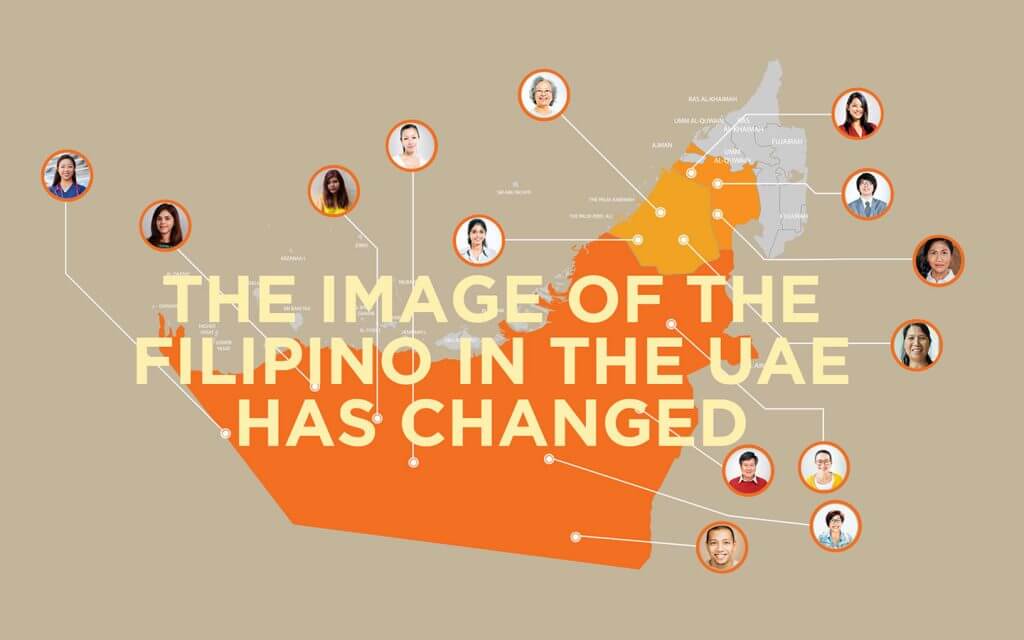Home is where the heart is, and for many of our kabayans, the United Arab Emirates (UAE) has become home—providing a safe space that allows them to pursue their dreams.
Today, our typical kabayan in the UAE is a well-educated, highly skilled professional working in a technical or creative field. He is full of hope, vibrant and enjoying life at the same time—a far cry from the stereotype low-skilled worker of our yesteryears.
Indeed, the face of the Filipino worker in the UAE is continuously undergoing a tremendous transformation. Where once we knew overseas Filipino workers (OFWs) as low-skilled workers destined to a life of manual labor, today’s Filipino workers in the Emirates have transcended boundaries, breaking stereotypes and creating a strong presence in almost every sector, such as information technology, the sciences, business, the arts. In fact, a noted few are even making waves globally in creative fields, such as fashion and furniture design.
Today, no one questions that Filipinos in the UAE are among the most skilled, dynamic and prosperous—demonstrating not just their highly valued skills but also distinctive Filipino traits: caring, collaborative, creative and colorful.
In fact, Filipino workers have long become deeply interwoven into the economic and cultural fabric of the UAE. It is therefore not a surprise that the Filipino community in the UAE is very engaged, increasingly wealthy and is actively looking for ways to help support the diverse, tolerant and multicultural country that they now proudly call home.
In our quest to better understand Filipinos in the UAE and hopefully, guide institutions and companies to see them not only as consumers but as powerful allies with unique aspirations and dreams, EON has released a pioneering research called, “EON Insight: Focus on the Filipino in the UAE.”
The report validates the observation that the narrative of the Filipino overseas worker has changed, a transformation that has taken place because the UAE provides them the optimal environment combining economic opportunity, tolerance and the space to celebrate their authentic selves.
Beyond peering into the thinking and aspirations of Filipinos in the UAE, the report recognizes the rising purchasing power of the sizeable Filipino community, which UAE companies can no longer afford to ignore. Together, these individuals are a significant and important player—ready to purchase their own homes, build smarter relationships with financial services companies, and explore the world of entrepreneurship.
This narrative is fleshed out in the report’s five key findings, as follows:
First, the UAE is a highly attractive destination for professional Filipinos due to the economic opportunities it provides and its tolerant open society. The 2019 Philippine Trust Index showed that the UAE is Filipinos’ top work destination in the Middle East. Highly skilled Filipinos are now represented across all industries in the country. In fact, 64 percent of Filipinos in the UAE are college graduates and 6.7 percent hold postgraduate degrees.
No doubt, the UAE’s unique mix of policies, programs and initiatives, as seen in its strong infrastructure, economic development agenda centered on diversification, and extensive government support for entrepreneurs, makes it a suitable environment for Filipinos ready to spread their wings professionally.
Second, the Filipino community is an ever-growing contributor to the economic diversification and growth of the UAE economy, with 62 percent of the Filipinos surveyed working in sectors that contribute heavily to the UAE’s economic diversification and expansion.
The top five sectors they work in are architecture, engineering and construction (17 percent), tourism and hospitality (16 percent), customer service (13 percent), health and medical fields (10 percent) and marketing and advertising (8 percent).
Among the participants, 37 percent earned at least AED 8,000 (about P111,000) a month with 20 percent earning AED 13,000 (P181,000) a month. In view of their growing disposal incomes, Filipinos in the UAE are spending on themselves, with 48 percent going to the mall at least once or twice a month, with 45 percent willing to spend up to AED 50 (about P700) for one meal and 16 percent willing to spend more than AED 80 (P1,100). The Philippines also benefits from their relatively higher income: in 2017, the UAE surpassed Saudi Arabia in becoming the second top source of remittances, coming just after the United States.
Third, the Filipino community has a long-term commitment to the UAE and is increasingly looking to invest and build deeper interlinked roots in the Emirati. More than 40 percent of Filipinos surveyed have been living in the UAE for two to five years, while 37 percent have been living in the UAE for more than six years. Over 30 percent say they intend to stay in the UAE for another three to five years.
Fourth, freedom to worship freely and in peace is a major draw for the Filipino community. In fact, a number of them spend their free time participating in church activities, such as Bible studies and community service programs.
Fifth, positive mentions of UAE by the Filipino community on social media have helped make the UAE a top 10 destination for travelling Filipinos. Filipinos are beginning to see the Emirates as a place to visit and possibly work or live in, thanks to these social media posts. In fact, Filipino influencers are making their mark in the UAE by creating well-curated content that is relevant to their fans and following, and are performing well in terms of engagement and reach. This shows that Filipinos are an untapped marketing force in the UAE as they are constantly connected online. Their social influence and digital behavior are perfect vectors to promote brands, services and causes.
For sure, there are many opportunities waiting to be tapped in the burgeoning Filipino market in the UAE, and these headline findings attest to this. There are no limits to the products and services that our kabayans may need, and those businesses that can tap into their needs and wants stand to gain much in the process. With creativity and resourcefulness, businesses can find ways to grow with this market, as the Filipino OFWs’ narrative continues to evolve.
More than any other time in history, it is time to set up Filipinos for success and break down the walls that keep them from realizing their full potential. The term “OFW” has outlived its purpose and should be reframed to shine a light on the contributions of the Filipinos in the countries where they are. “Global Influential Filipino Talents” is a reframing that captures the new narrative of the Filipino abroad—their creativity, role as social glue, and expertise act as gifts they generously share with the world.
It nudges all spectators, kabayans included, that when introduced to a setting that allows for authenticity and economic opportunity, Filipinos have the remarkable ability to shine, bright enough to illuminate even the darkest shadows of our past. The lesson is clear and approaching at breakneck speed—for fellow Pinoys, it is time to raise Pinoy pride and help surface the success stories that fall into the cracks; and for everyone else, it is time to get with the program.




